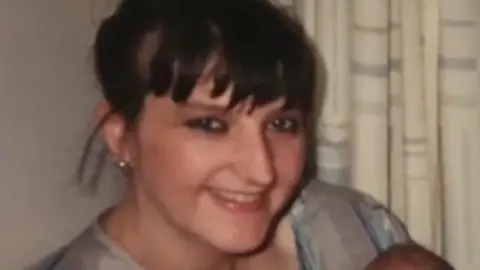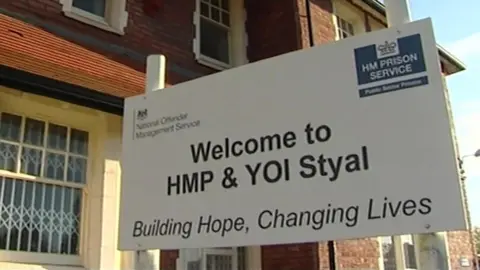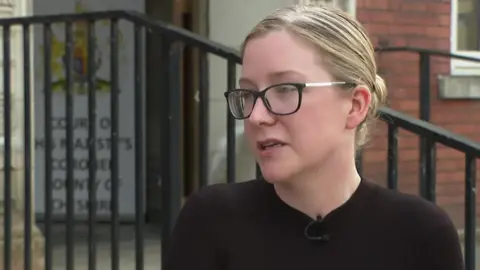Neglect and failures contributed to inmate's death, jury finds
 Family handout
Family handoutCommunication failures by prison officers and health care staff contributed to an inmate's death at a jail, an inquest jury has concluded.
Christine McDonald, 56, died in hospital after being found in her cell at HMP Styal in Cheshire on 3 March 2019.
An inquest in Warrington heard her death came two days after she and her daughter were arrested in Blackpool.
Concluding that neglect contributed to Ms McDonald taking her own life, a jury found prison staff did not follow guidelines on drug withdrawal and failed to pass on a message that her daughter was safe.
The inquest was told that during the arrest on 1 March, Ms McDonald's daughter fell from the roof of a three-storey building where the pair had been living and sustained serious injuries.
Ms McDonald was subsequently sentenced to 12 weeks at HMP Styal for shoplifting.
Her daughter Cheri told the jury that her mother and sister would use drugs together and “developed a toxic dependency on each other”.
She said her mother had been "a kind-hearted person who would do anything for anyone" despite her issues.
She added that after her arrest, her mother had been "beside herself not knowing what had happened to Kristy”.

The hearing was told that despite having a prescription for methadone, Ms McDonald was not given the drug to help with withdrawal symptoms as she was unable to produce a urine sample.
It also heard that staff at the prison knew she was anxious about her daughter's condition and had seen she was displaying symptoms of opiate withdrawal, which they acknowledged could increase the risk of self-harm.
The jury heard Ms McDonald was taken to hospital by two prison officers the day after she was sentenced due to her condition, but she discharged herself back to the prison, where she “wasn’t formally assessed on her return".
One of the nurses who gave evidence said the jail's health care team should know when a prisoner returns from hospital but admitted that "didn’t always happen".
- If you're affected by the issues in this piece, you can find support from BBC Action Line
Fellow inmates told the inquest they heard Ms McDonald was "withdrawing really badly" and was heard shouting threats of self-harm and pleas for medication from her cell.
The jury heard prison officers told her to sleep, did not alert a nurse and had not monitored her often enough on the night she died, despite regulations for frequent monitoring of prisoners who were in drug withdrawal.
They were also told the prison officer who found her in her cell did not raise a "code blue" alarm, which would have alerted an ambulance to attend immediately, and the first nurse to arrive at the cell was not told she had tried to take her life.
Ms McDonald was taken to Wythenshawe Hospital where she was pronounced dead on 3 March.

Concluding the inquest, Charlotte Keighley, assistant coroner for Cheshire, said she would be writing a prevention of future deaths report to the prison's governor and HM Prison Service.
She said she had serious concerns about the lack of use and understanding of the emergency response codes in prisons.
Speaking after the hearing, Cheri McDonald said "all the failings that were acknowledged today I have always believed contributed to her death".
"To hear that out loud and have that on record is really important," she said.
She said she hoped the coroner's report would "send a serious message".
"The difficulty is that they have had this message for years and it's still a failure," she added.
The charity Inquest, which has supported Cheri McDonald throughout the case, said Ms McDonald’s death was one of 26 at HMP Styal since 2007, 11 of which had been self-inflicted.
A representative said that figure was higher than in any other women’s prison in England and Wales.
They added that many of the recommendations made in 2007's Corston Report, which was triggered by a spate of deaths at HMP Styal and called for women's prisons to be completely dismantled in favour of small custodial units, had not been enacted and deaths continued to occur.
Listen to the best of BBC Radio Manchester on Sounds and follow BBC Manchester on Facebook, X and Instagram. You can also send story ideas to [email protected]
